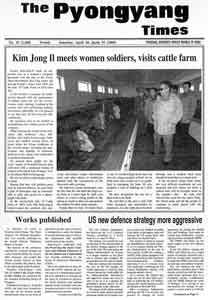The Pyongyang Times
 | |
 Front cover of The Pyongyang Times | |
| Type | Weekly newspaper |
|---|---|
| Format | Tabloid |
| Launched | 6 May 1965 |
| Political alignment | Workers' Party of Korea (Pyongyang city party committee)[1] |
| Language | English and French |
| Headquarters | Sochon-dong, Sosong District, Pyongyang, DPRK[2] |
| City | Pyongyang |
| Country | North Korea |
| Circulation | 30,000 (as of 2002) |
| Sister newspapers | Pyongyang Sinmun |
| OCLC number | 7713208 |
| Website |
www |
The Pyongyang Times is a weekly state owned English and French-language newspaper published in the North Korean capital, Pyongyang. It is the foreign language edition of the Pyongyang Sinmun.[1]
History and availability
The eight-page tabloid was first launched on 6 May 1965, and is distributed in approximately 100 countries.[3][4] For this reason, its staff are trained in English abroad. The newspaper also runs a website in several languages.[3] Fifty-two issues of the paper are published annually.[5] As of January 2012, there have been 2,672 issues. The circulation of the English and French editions is 30,000.[1]
In North Korea, The Pyongyang Times is circulated in hotel lobbies, flights into the country and other places frequented by foreigners.
Naenara (내나라), the official North Korean news source, is the home of the Pyongyang Times.[6]
Structure and content
The structure of the paper is as follows: The front cover is usually devoted to Kim Jong-un, particularly visits to various institutions in the country and praising his leadership. The next few pages detail various technological and ideological exploits of the nation, followed by propaganda against South Korea, Japan, and the United States and other nations (such as Israel) who are considered hostile to North Korea.[7] The last pages are similar to that of the Rodong Sinmun, offering "foreign news" — though little major world events are covered, and most of its content is focused on like-minded or socialist nations.[8]
Most of its content, like all North Korean state media, is dedicated to leader Kim Jong-un. More specifically, most of the paper's news is translated from articles in the Rodong Sinmun.[8] It has been described as lacking "actual news"[9] and is "basically a rundown of Mr Kim's daily agenda, with substantial flattery thrown in for good measure."[10]
Claims
The Pyongyang Times has made various claims about South Korea, particularly with regards to its allegedly poor human rights record. It has stated that 50% of South Koreans are unemployed, 57.6% are infected with tuberculosis and that American soldiers with AIDS are posted in the south as a deliberate policy to infect the South Korean population.[8] In a 31 May 1986 article, it criticised the decision that the 1988 Olympics were to be held in South Korea, purporting that "If the Olympic Games were to be held in South Korea, many sportsmen and tourists of the world would meet death, infected with AIDS."[11] Meanwhile, it has described North Korea as the only country in the world that has no HIV/AIDS sufferers.[12]
However, the paper was relatively open during the major flooding in 2007, providing an extensive list of damage in the country. It stated that 20,300 homes were destroyed and "several hundred" people had died, as well as damage to "223,000 hectares of farmland, 300 bridges, 200 mining pits, 82 reservoirs and 850 power lines."[13][14]
See also
References
- 1 2 3 Yonhap News Agency, Seoul (27 December 2002). North Korea Handbook. M.E. Sharpe. p. 416. ISBN 978-0-7656-3523-5.
- ↑ "Naenara". naenara.com.kp. 2015. Retrieved 2015-02-13.
- 1 2 "North Korea This Week No. 435 (8 February 2007)." Yonhap.
- ↑ 2,000th issue of Pyongyang times. Korean Central News Agency. 2 March 1999.
- ↑ "Pyongyang Times". MapXL Inc.
- ↑ "Korean Studies: Newspapers". George Washington University. Retrieved 30 November 2015.
- ↑ Wee, Teo Cheng (1 May 2006). Passage to Pyongyang: Key information. Asiaone Travel / The Straits Times.
- 1 2 3 Andrew Holloway (2003). A Year in Pyongyang. Published by Aidan Foster-Carter. Honorary Senior Research Fellow in Sociology and Modern Korea, Leeds University. OCLC 824133830.
- ↑ Bloomfield, Steve (25 April 2004). How news broke in Pyongyang - silently. The Independent.
- ↑ Lister, Richard (28 October 2000). Life in Pyongyang. BBC News.
- ↑ Senn, Alfred Erich (1999). Power, politics, and the Olympic Games. Human Kinetics. p. 221. ISBN 978-0-88011-958-0.
- ↑ "North Korea Expels 27 Foreign HIV Carriers: Report." Yonhap. 18 December 2004.
- ↑ Johnson, Tim (3 September 2007). North Korea opens up, a little. The McClatchy Company.
- ↑ Watts, Jonathan (3 September 2007). New paint and MP3 players: Pyongyang's nuclear dividend. The Guardian.